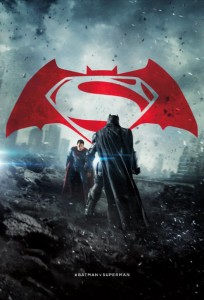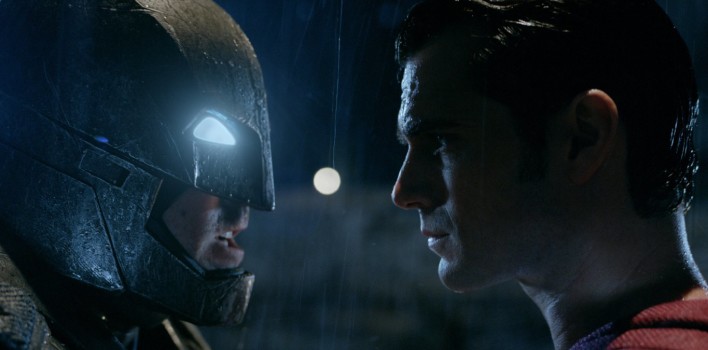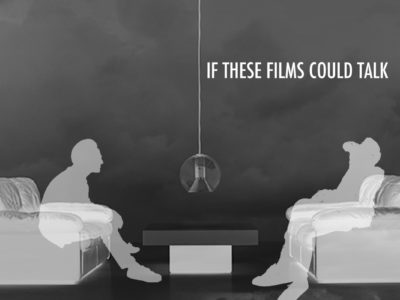Review| Batman v Superman: Dawn of Justice
Author’s Note: Here are a couple of things to be aware of before you dive in. First, this is a spoiler-free review; as such, I will leave the bulk of my analysis of the film’s theological themes, motifs, etc. for a spoiler-filled review, which will be posted at a later date. Second, it usually takes me a fair amount of time to process movies, and since I am writing this review immediately after seeing the film, my views and opinions will develop over time. What follows is an early impression.
 If you have been alive and on the internet at all since Tuesday evening when the review embargo lifted and critics’ searing reviews began to permeate the vast reaches of cyberspace, then you know of the firestorm surrounding Batman v Superman: Dawn of Justice, Zack Snyder’s highly anticipated followup to 2013’s Man of Steel. The vast majority of critics hate it, and much of fandom has revolted by spewing unpleasant rhetoric in return. After all, in the age of film criticism aggregators, nothing starts a fight like seeing a squishy green vegetable beside a superhero flick. I, however, would like to avoid this kerfuffle as much as possible, so here is the deal: I am going to tell you what I think of BvS and why I feel the way I do, but I am not going to pretend that my take is an authoritative or objective assessment. Now … into the fray I go.
If you have been alive and on the internet at all since Tuesday evening when the review embargo lifted and critics’ searing reviews began to permeate the vast reaches of cyberspace, then you know of the firestorm surrounding Batman v Superman: Dawn of Justice, Zack Snyder’s highly anticipated followup to 2013’s Man of Steel. The vast majority of critics hate it, and much of fandom has revolted by spewing unpleasant rhetoric in return. After all, in the age of film criticism aggregators, nothing starts a fight like seeing a squishy green vegetable beside a superhero flick. I, however, would like to avoid this kerfuffle as much as possible, so here is the deal: I am going to tell you what I think of BvS and why I feel the way I do, but I am not going to pretend that my take is an authoritative or objective assessment. Now … into the fray I go.
Batman v Superman: Dawn of Justice picks up near the end of Man of Steel. Zod (Michael Shannon) and Superman (Henry Cavill) are locked in the battle that infamously destroys much of Metropolis, and caught up in the chaos is Bruce Wayne (Ben Affleck). After witnessing the collapse of one of his buildings and the suffering on the ground, Wayne vows to stop this kind of thing from happening again and forms a deep-seated distrust of The Big Blue Boy Scout. Coming along to ensure that the two heroes clash in an epic showdown is Lex Luthor (Jesse Eisenberg). 18 months later, things come to a crossroads.
Simply put: I loved Batman v Superman. The ostensibly contradictory caveat to my claim is that I actually agree with many—but not all—of the criticisms being leveled at this film. Yes, it has more subplots than you can shake a stick at; and for at least the first half of the film, I felt tossed to-and-fro, around the planet, from set-piece to set-piece. Yes, the Junkie XL and Zimmer’s score is overbearing at times; it’s really loud and bang-full (that’s a technical term, I’m sure), folks. There are a couple of action sequences that are too tightly framed. And finally, yes, there is quite a bit of on-the-nose religious dialogue and imagery, much of which feels a little too forced for my liking. In other words, there are problems with this film. And while I understand that for many viewers and critics the issues with Batman v Superman render the film unenjoyable—a charitable interpretation of many reactions—I can only say that I find a lot to love.
One reason I thoroughly enjoyed Batman v Superman is because of the lengths to which it goes in order to pay homage to the medium from which it  draws inspiration. The film’s frenetic narrative threads, which, as noted earlier, are not completely tied together in seamless execution, lend the film a remarkably authentic comic book feel, as if we are watching the panels on a page unfold and come to life before our very eyes. While Snyder’s favorite cinematographer Larry Fong has come under much scrutiny for his supposedly washed-out, drab, and lifeless color palette, I found his compositions in BvS vivid and striking, at times appropriately invoking the art of Frank Miller’s The Dark Knight Returns.
draws inspiration. The film’s frenetic narrative threads, which, as noted earlier, are not completely tied together in seamless execution, lend the film a remarkably authentic comic book feel, as if we are watching the panels on a page unfold and come to life before our very eyes. While Snyder’s favorite cinematographer Larry Fong has come under much scrutiny for his supposedly washed-out, drab, and lifeless color palette, I found his compositions in BvS vivid and striking, at times appropriately invoking the art of Frank Miller’s The Dark Knight Returns.
Additionally, this is a superhero movie with a backbone. From start to finish, Batman v Superman made me feel like there are real stakes and real issues at play in a way that no movie in the MCU has, and much of this is due to the characterization of the film’s title players. It is here that many of the most ardent comic book fans and critics can unite: Snyder is guilty of character assassination. He hates Superman, wants him off the screen (I will admit that I would have preferred a little more screen time for my favorite superhero), and doesn’t understand the “essence” of what makes him a beloved character. Moreover, Snyder has turned Batman into a maniacal, brutal killing machine. Or so they say. I contend that we could all use a little more of Linda Hutcheon’s A Theory of Adaptation in our lives. Hutcheon notes that we do well to imagine adaptations as “haunted at all times by their adapted texts”—not utterly and inviolably beholden to the source or some reductionistic definition of their quintessence. I am completely on board with what Goyer, Snyder, and Terrio are doing with these beloved icons of the DC cinematic universe.
 Much credit for the film’s success is due to the fantastic performances turned in by the cast. Ben Affleck—yeah, the same one that many people simply could not envision as the caped crusader some months ago—is Batman and the embodiment of Bruce Wayne. He carries the bulk of the film on his very muscular shoulders. Carry on, Ben. Henry Cavill gets to show some more range as Superman, and if he is not careful, he will end up being my favorite filmic representation of the character. Jesse Eisenberg’s twitchy and neurotic Lex Luthor, though understandably annoying to some, felt quite refreshing as well. (We’ve seen enough bulky, deep-voiced incarnations of the villain.) Gal Gadot (Wonder Woman) is, well, wonderful in her sparsely allotted screen time. If these are to be the lifeblood of the franchise, then we are in capable hands indeed.
Much credit for the film’s success is due to the fantastic performances turned in by the cast. Ben Affleck—yeah, the same one that many people simply could not envision as the caped crusader some months ago—is Batman and the embodiment of Bruce Wayne. He carries the bulk of the film on his very muscular shoulders. Carry on, Ben. Henry Cavill gets to show some more range as Superman, and if he is not careful, he will end up being my favorite filmic representation of the character. Jesse Eisenberg’s twitchy and neurotic Lex Luthor, though understandably annoying to some, felt quite refreshing as well. (We’ve seen enough bulky, deep-voiced incarnations of the villain.) Gal Gadot (Wonder Woman) is, well, wonderful in her sparsely allotted screen time. If these are to be the lifeblood of the franchise, then we are in capable hands indeed.
Ultimately, however, it is the film’s third act that seals the deal, winning my heart and genuinely capturing my affections. And that is not hyperbole. The V in Batman v Superman pays off in a big way, and the final moments left me moved and (I kid you not) holding back tears. (I will unpack some of thematic significance of the final act a later point in my spoiler-filled review, so stay tuned.) In the end, the film may not work for you. You may hate it, and you may vehemently disagree with my conclusions. Go see it; decide for yourself, and let me know what you think in the comments.








Pingback: #094 – Batman v Superman and Divisive Interpretations | Reel World Theology